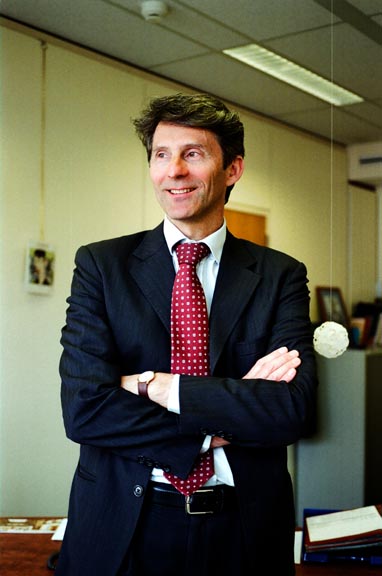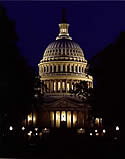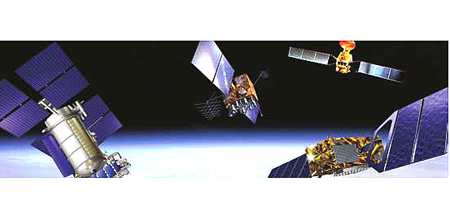 Paul Flament, Head, European Commission Satellite Navigation Unit. Photo by Peter Gutierrez
Paul Flament, Head, European Commission Satellite Navigation Unit. Photo by Peter GutierrezPaul Flament is head of the European Commission’s Satellite Navigation Unit. His primary job, essentially, is to manage the Galileo program of the European Union (EU). With four operational satellites now in orbit and an ambitious schedule to set in place a constellation of 26 by 2015, Flament sat down with Inside GNSS to talk about a number of pressing issues that could affect the future of Galileo.
Flament first addressed the EU GNSS Regulation, the much-anticipated document that sets out just who will do what in the future Galileo program.
Paul Flament is head of the European Commission’s Satellite Navigation Unit. His primary job, essentially, is to manage the Galileo program of the European Union (EU). With four operational satellites now in orbit and an ambitious schedule to set in place a constellation of 26 by 2015, Flament sat down with Inside GNSS to talk about a number of pressing issues that could affect the future of Galileo.
Flament first addressed the EU GNSS Regulation, the much-anticipated document that sets out just who will do what in the future Galileo program.
“According to our current vision, as spelled out in the Regulation, the GSA [European GNSS Agency] will handle program exploitation,” he said. “The EC will retain overall political supervision, but we will not manage operations. For its part, ESA will complete the deployment phase and thereafter remain the technical arm of implementation, working to update and maintain the Galileo system.”
“This is the principle. We are preparing the translation of this principle into practical relationships, the handing over of the various responsibilities, to complete the transition.”
What about rumored strains in the EC-ESA relationship? There can be no disputing the fact that over the past decade ESA has seen its world shaken to the core, the one-time holder of a virtual monopoly over European space activities now having to share credit with upstart EU institutions.
Flament doesn’t see it that way.
“Mr. Tajani, Vice-President of the Commission and in charge of Galileo, and Mr. Dordain [ESA Director-General] know each other well and respect each other. ESA-EC relations are good. There can be diverging views at some point, yes, but no opposition.”
Despite his position, Flament says that he sees the interagency process from ground level.
“We are engineers, we have a job to do, we have common interests, and we work well together on a daily basis,” he says.
“Every day, it works. True, there is a change in organization. Over time we have seen more and more EU funding going to projects undertaken by ESA. Soon, almost 100 percent of ESA’s satellite navigation will come from the EU.”
Indeed, sources in the European capital have been raising the possibility of an even more fundamental shake-up in the way space activities are organized and undertaken in Europe. Could a deeper and more complete merging of the various entities, in particular the Commission and ESA, be on the horizon?
Flament doesn’t say that, exactly.
“Under the MFF [the Multi-Annual Financial Framework, i.e. the overall EU budget] under discussion, the budget for Copernicus, the program formerly known as GMES, is €3.8 billion over the period 2014–2020. For space research we have another €1.5 billion or so. Altogether, we have around €11 billion for all space activities over the period 2014-2020. The EU is putting more and more of its money into ESA activities.”
Apparently, there are new moves being made to clarify the situation.
“The Commission published a Communication on overall EU-ESA relations last November. The question was discussed at the last ESA Ministerial Council in Naples. We expect at some point to see an agreement,” Flament said.
Not So Fast
Before we go any farther, let’s remind ourselves. The EU GNSS Regulation has not yet been adopted. As Flament explains, the final status of the Regulation is closely linked with that of the Galileo budget.
“In order to implement a program or an activity and its budget, we need a Regulation to cover that program or activity,” he says. “More than a year ago, the European Commission submitted the new EU GNSS Regulation to the European Parliament and the Council of the EU. The aim is to have this adopted in ‘first reading.’’”
“The Parliament and Council adopted their negotiating positions in September and June of last year. Subsequently, the Commission, the Parliament and the Council, began negotiations in what is called a ‘trilogue’. This trilogue ended last week [speaking on 17 April 2013] with a three-way consensus. That means we have an agreed Regulation text, which should be considered stable.”
However, Flament explains, final adoption of the new regulation by the Parliament is subject to approval of the EU’s new overall budget, which still has not taken place. He hopes this will happen between next June and next September. That is, if all goes according to plan.
But what about the rumblings we heard in the wake of the EU budget talks last February, when, for the first time ever, Union leaders agreed to a real-term cut in spending? This cut in the overall budget also had an effect on the Galileo budget.
“We had originally asked for €7 billion for the Galileo program,” he says. “When the budget talks ended, that had been reduced to €6.3 billion. Obviously, we had to make some adjustments. We had to reduce the duration of certain contracts, for example. And we had to readjust our risk management mechanisms.”
Flament added, “We would have had difficulties if we had got less than €6.3 billion.”
But even more difficult would be the scenario wherein the Parliament decides not to approve the overall budget at all.
When the spending reduction negotiated by EU heads of member-states was announced in February, EU parliamentarians, the majority of whom had supported higher budget figures, wasted no time in venting their anger. The parliament’s President Martin Schulz was quoted as telling the EU leaders who had negotiated the deal that it was his bunch, the lawmakers, who would have the last word, thus appearing to promise a further battle to come, perhaps involving the Parliament throwing out the budget altogether and the whole thing returning to square one.
Flament downplays this possibility.
“The Parliament represents EU citizens; so it isn’t surprising to see its reaction to the reduced budget,” he says. “Parliament has a tradition of calling for a stronger budget to reinforce the EU.”
Fair enough, but still, what if the unthinkable does happen and Parliament follows through on its threat to boot the budget?
“If the overall MFF does not go through as we expect it to, if it takes more time than foreseen — for example, if 2014 arrives and we still don’t have a budget agreement — then things could get very difficult indeed,” Flament says.
“I am optimistic now. I don’t want to think about the scenario of no budget agreement before 2014.”
Galileo Selling Points Still Valid?
Fingers crossed then, we move on to the next question. What does the future Galileo look like, or, better yet, what does it have to offer? After all, we already have GPS.
“Engineers know that reliance on one system — in this case GPS — is never a good idea, especially with so much of our GDP, 6–7 percent, now totally dependent on GNSS,” Flament says. “Still today, GPS is the only reliable system that we can use. If suddenly there is no GPS, for whatever reason, we are in big trouble.”
He adds, however, “Of course, there is the incentive of being better than GPS. Galileo achieved a major milestone just a few weeks ago [12 March 2013] when the first position fix was obtained based on signals emitted from the four satellites already deployed.”
Flament asserts that the “stability” of the Galileo signal, with just four satellites in orbit, “is better than that of GPS,” adding, “This is due in large part to the passive hydrogen maser clocks on our satellites, which are more stable than those on GPS satellites.”
Nonetheless, he insists that the Galileo program is “working on very good terms with the USA. We don’t see ourselves as competitors. USA is a partner. Galileo and GPS are complementary.”
Flament says the Commission also sees Galileo as a stimulus for both technological and economic activity.
“The Galileo program is good for European science and for European companies. There are many examples of dynamic European companies that would not exist today were it not for Galileo.”
Is there still an argument for a Galileo Commercial Service (CS)? Why should people pay for something that they can get for free?
“The Galileo Commercial Service must represent some added value,” Flament says. “As people will buy bottled water because it has no chlorine, the CS will have to offer more of something. And we believe it does have something that sets it apart.”
Two things, in fact.
“First, there is the key concept of authentication,” he says. “To give just one example, fishing regulators need better systems for tracking fishing vessels, to know where they are and if they are operating fairly and legally, according to regulations. But spoofing technologies are available that could potentially fool these regulators. The Galileo CS will give the relevant authorities the tool they need to defeat spoofers.
A similar anti-fraud argument can be made in other transport areas, he says — in the trucking sector, for example, adding that national authorities and regulators are “definitely interested” in the Commercial Service.
“Secondly, the CS will be more precise and more accurate than the open signal,” Flament continues. “With GPS and Galileo, we are looking at meter-level accuracy. With the CS, we will have accuracy down to the centimeter level. Customers are certainly ready for this kind of service — surveyors, for example, or oil platform operators, where helicopter transport is vital.”
“Having said this, we also know that revenues from the CS are not likely to completely cover the cost of operations. This means Galileo will continue to require public funding. Galileo represents a public good, an important infrastructure to sustain market activities, growth and jobs.”
Status of EU-China Relations
One outstanding thorn in the side of Galileo has been the Chinese BeiDou plan to use radio frequencies overlapping those that Europe wants to use for the secure Galileo Public Regulated Service (PRS). But Flament suggests that the formerly rough EU-China seas have now calmed.
“The Chinese have agreed that the Galileo/Beidou overlap issue will be addressed within the ITU Framework, so this puts the relevant parties around the table and we expect a mutually beneficial resolution,” he says.
ITU is the International Telecommunication Union, which, among other things, coordinates the shared global use of the radio spectrum.
“Signal interference is bad for everyone, for the EU and for China. Again, common interests demand that we work together to find a solution,” Flament says. “On the technical level, we are proceeding as technicians do. We have a common problem and we will solve it. Our technical exchanges with the Chinese are continuing and they are positive.”
What about potential PRS customers? Have the EU Member States held back while the BeiDou/PRS question remains unanswered?
“The Member States are not hesitant, no,” he says. “As soon as we announced the PRS demonstration phase, with pilot projects, we had numerous expressions of interest from many quarters. All signs are good for the PRS.”
Many Markets — Selling Galileo Everywhere
Meanwhile, Flament says the commission continues to push for a more global perspective for European GNSS.
“European GNSS is a product we can sell around the world,” he says. “The GNSS market is a global market.”
The GSA’s latest market forecasts show “big things” happening in the coming years. “We will see GNSS generating many new opportunities for downstream business. Satellite navigation fits very well into the European Union’s larger strategy for economic growth.
”In Asia, industrial cooperation is our goal, trying to find synergies with Asian partners, working together as equals,” he says. “This cooperation needs to benefit partners on both sides.”
Flament adds that is is important for Europe to be able to see Galileo-enabled products emerging everywhere — so, European industry and political leaders need to know those markets, to be engaged, and to develop products and services that are adapted to those regions’ particular needs.
“In Russia we have a different situation,” he says. “We have been entrusted, since 1999/2000, with the task of negotiating a GNSS agreement with Russia. GLONASS has had problems to solve, they have been busy, and we have seen variable amounts of interest in addressing European/Russian issues over that time.”
Now, however, the two sides are resuming discussions. “We sense a real interest, Flament says. His office hopes to be in a position soon to sign a “joint declaration” on GNSS and soon thereafter, a text that would lay the groundwork for future cooperation.
“In parallel, technical discussions between us and the Russians are frequent,” Flament adds. “They have a working satellite navigation system. Technical talks are moving forward, in particular within the context of the International Cospas-Sarsat Program, where we believe Galileo has a key role to play.”
And Paul Flament has a role to play too. As Galileo moves closer and closer to real operations, after years of setbacks and delays, one could scarcely imagine anyone better-prepared than this optimistic yet level-headed engineer to hold the reins as the program finally takes off.
The schedule for deployment is indeed ambitious. It should make for an interesting show.





